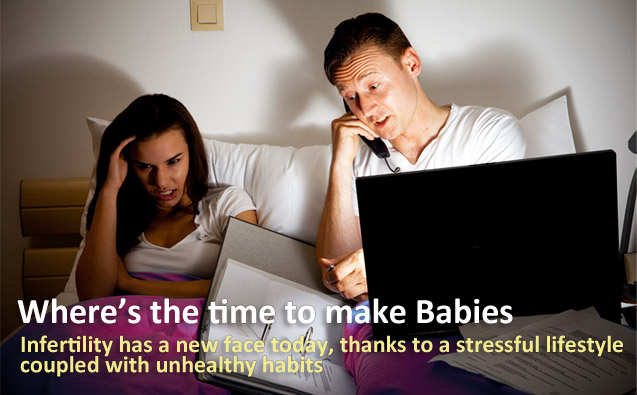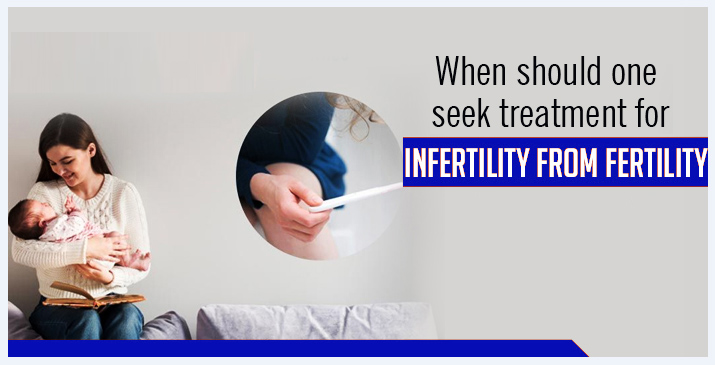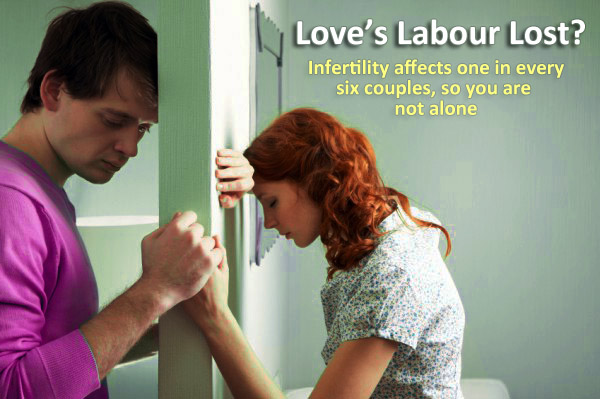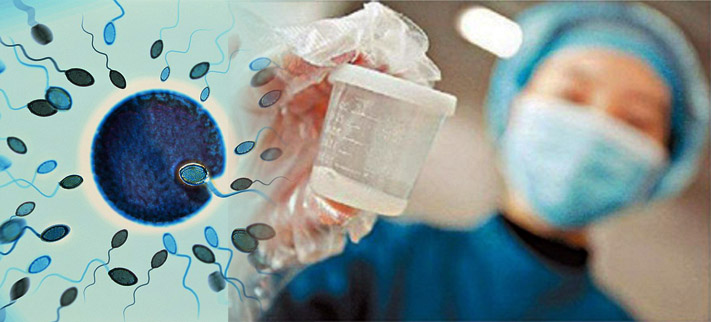Infertility has a new face today, thanks to a stressful lifestyle coupled with unhealthy habits

Wannabe parents do it. Celebs do it. Even J-Lo is doing it! No it’s not what you’re thinking. We’re talking about Assisted Reproduction Technologies (ART), which helps people make babies the scientific way. Infertility expert Dr Anjali Malpani has stopped counting the number of couples visiting her clinic in Colaba, Mumbai for ART. They come from all over , especially many from the IT hubs of Bangalore and Pune. “Thanks to their ambitious career drive, they work long hours, eat junk food, deal with a lot of stress and when they come home, have little time or energy to indulge in sex. This lifestyle pattern, mostly seen in India’s A and B cities, is resulting in couples suffering from infertility,” she observes. Dr Firuza Parikh, director, department of assisted reproduction and genetics, Jaslok Hospital, Mumbai, concurs. “For the last 10 years, couples seem to meet more in the boardroom than the bedroom. Even when they are in bed, they have sex very sporadically, which does not ensure pregnancy. This is what I call voluntary infertility. Today, three out of 10 couples, who come for infertility treatment, belong to this category,” says Dr Parikh. In fact, beside obesity, the other lifestyle disease, diabetes, affects the sperm count and motility of the sperms. A woman who gets pregnant by a diabetic man is more prone to miscarrying. Some jobs also carry an added risk. “I have seen that men exposed to radiation (such as orthopaedic surgeons, radiation specialists, interventional cardiologists, etc.) tend to have more abnormal sperms. Similarly, stress hormones affect ovulation in females. I have particularly seen this with flight attendants. In fact, lifestyle is a menace that alone can generate infertility in an otherwise perfectly healthy couple. Men from a rural environment have a more robust sperm count. We urbanites have deleted the word ‘leisure’ from our dictionary, it seems,” says Dr Parikh.
Another fall-out of this hectic lifestyle that affects fertility is when people are obsessed with fitness and embark on excessive diet and exercise programmes or are so absorbed in their career plan that they follow irregular food habits, which results in obesity. In either case, it promotes infertility, says Dr Malpani. There is an equal number of male and female infertility cases. Lifestyle affects women in ovulation and men in their sperm counts, motility of the sperms as well as production of abnormal sperms.
How infertility can strike you…
YOU’VE WAITED TOO LONG : This is the most important reason why several couples, especially women, are facing infertility problems. These days, couples are postponing their conception, says Dr Malpani. By the time a woman turns 40, the pool reserve of her eggs gets depleted. So the biological clock for producing children practically stops, observes Dr Parikh. Unlike a man, who can produce sperms till he dies, a woman is born with half a million eggs that deplete as she ages. Till about the age of 35, a woman’s chances of conception are very high (about 55 per cent). The 36-40 age-group is the grey zone, where the chances of conception drop to about 20-25 per cent. As a woman ages the success rate of assisted reproduction technologies procedure also drops proportionately.
YOU SMOKE OR DRINK : Dr Parikh observes that an ongoing study on the effects of smoking on sperm count at Jaslok Hospital shows a marked increase in abnormal-looking sperm, which also affects men’s fertility potential. International studies reveal regular smoking actually brings down the sperm count by 15 per cent. The good news is that the effects are reversible. According to Dr Malpani, when a chain smoker has stopped smoking for a year, his sperm count increases between 50 and 800 per cent! These days, women too smoke a lot, which results in fewer chances of conception, higher incidences of miscarriage and premature births (which, in medical parlance, is known as secondary infertility).
Alcohol without which parties, it seems, fail to sparkle, can affect the male libido and therefore indirectly promotes infertility, says Dr Parikh.
YOU’RE ON MEDICATION : More people are suffering from diseases like asthma and hypertension, thanks to unhealthy living habits. But they need to be careful while popping their regular pills, says Dr Parikh. For example, a study reveals that up to 95 per cent of men taking some anti-hypertensives (used to treat hypertension) are reversibly infertile. It is believed that these drugs may elevate the cholesterol level in sperm, leading to the decreased ability of the sperm to bind the eggs. With women too, some anti-hypertensives block fertility.
YOUR ENVIRONMENT IS POLLUTED : Plastic (never mind the number of microns, all of it emits xenoestrogen), exhaust fumes like lead, pesticides like DDT, dioxine (industrial chemical) and such other pollutants, contribute to falling of sperm count, says Dr Malpani. In fact, we are surrounded by toxins everywhere. We breathe paints, we breathe, eat and drink pesticides… In the long run, all this can suppress spermatogenesis. Toxins also affect the quality of eggs, says Dr Parikh.

Infertile, yet want a baby?
Dr Indira Hinduja offers some options…
- The most common type of ART is IVF. Here, eggs and sperm are mixed in a laboratory dish to fertilise and then, once the embryo is formed, it is transferred to the woman’s uterus.
- In Gamete Intrafallopian Transfer (GIFT), eggs are collected from the ovaries, then placed into a thin flexible tube with the sperm. This is then injected into the woman’s fallopian tubes, where fertilisation takes place. GIFT is more invasive than IVF and the success rate is about the same.
- Intracytoplasmic Sperm Injection (ICSI) is the injection of a single sperm into an egg. Following fertilisation, the embryo is then placed in the woman’s uterus. Often used in conjunction with IVF, ICSI is often a successful treatment for men with impaired sperm.
- There are two surgical procedures (PESA and TESA) to retrieve sperms from the epididymis or testes when it is not available in the semen. Then the ICSI procedure is used.
- Zygote Intrafallopian Transfer (ZIFT) combines IVF and GIFT. Eggs and sperm are mixed outside the body and fertilised. The embryo is implanted surgically to the fallopian tubes.
- Apart from the above procedures, egg donation, embryo donation and surrogate motherhood are also part of ART, where a third party is involved.
- When there is a history of genetic abnormality or repeated failure of other procedures of ART, Pre-implantation Genetic Diagnosis (PGD) is used. Here, the sperm and the egg are brought together in the laboratory and genetic evaluation of the embryo is done to ensure a higher success rate of pregnancy and to prevent birth defects.



